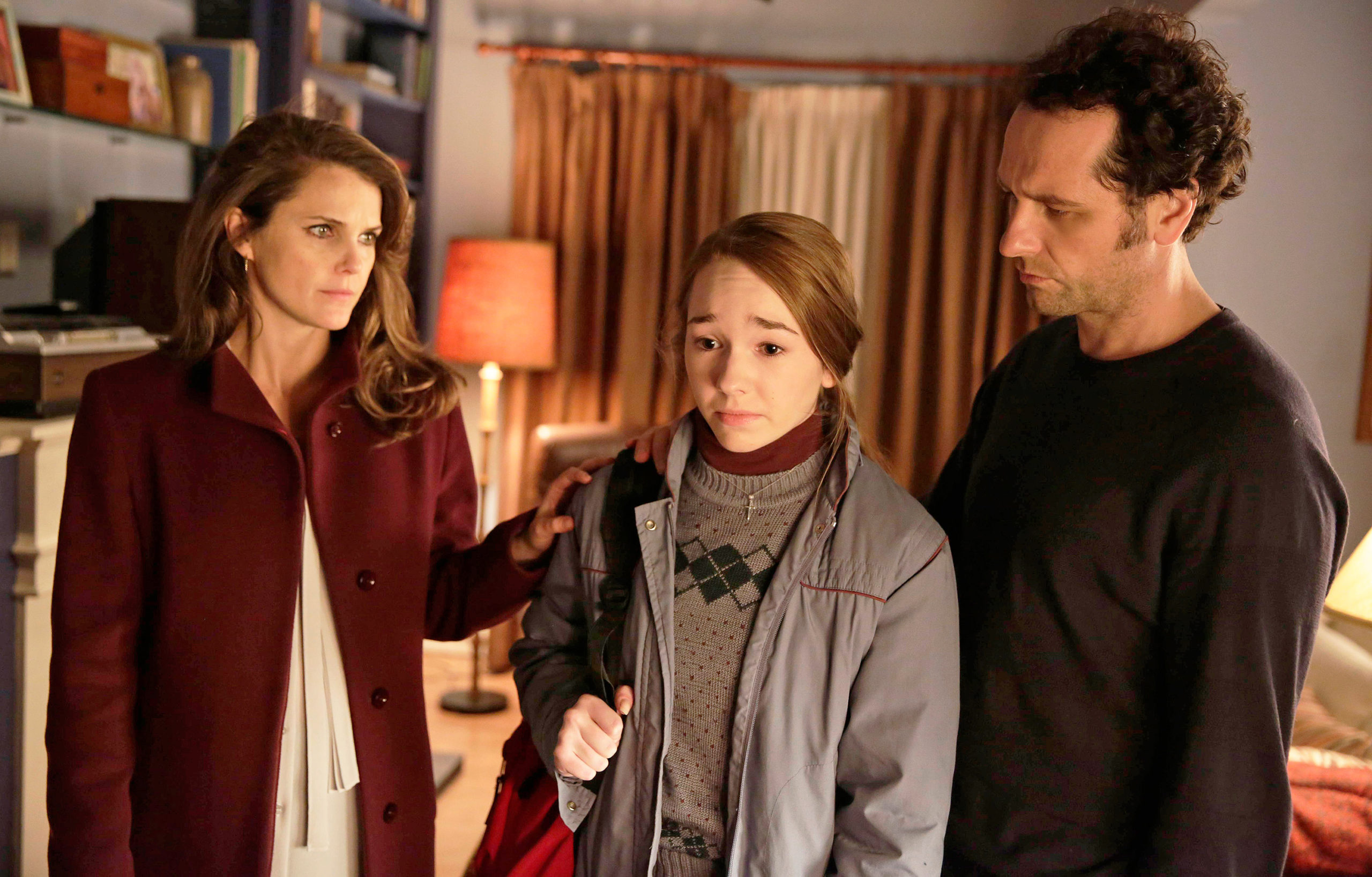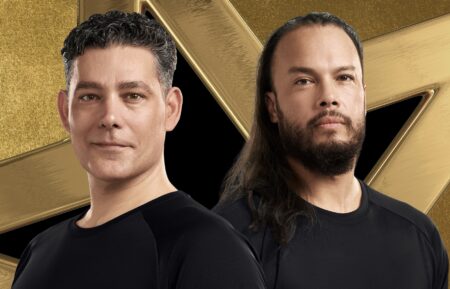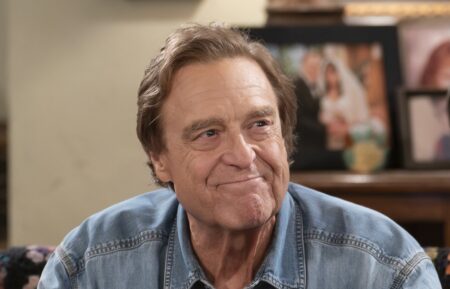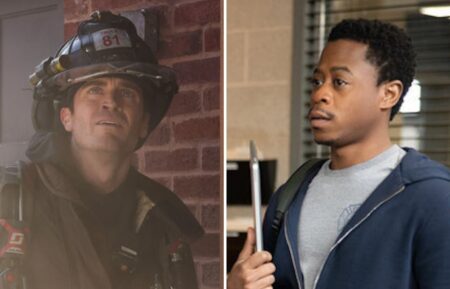How ‘The Americans’ Cuts Through the Spycraft to Tell an Immigrant Story

FX’s brilliant Cold War thriller The Americans returns for a fourth riveting season. Even though the world will be danger from a deadly new biological weapon, there will also be higher emotional stakes for KGB spy couple Philip (Matthew Rhys) and Elizabeth (Keri Russell) Jennings. Thanks to Elizabeth’s decision to confess her spy life to daughter Paige (Holly Taylor), the idealistic teen not only knows that mom and dad work for the Soviet Union, but she’s spilled the beans to Pastor Tim (Kelly AuCoin). And we know the Jennings don’t like loose ends, which means the pastor’s life may be in danger. We spoke to executive producers Joel Fields and Joe Weisberg to learn more about everything that’s changing in Season 4.
RELATED: Can The Americans Sustain the Secrets and Lies in Season 4?
Your themes in past years have included marriage and family. What is this year?
Joel Fields: Home.
Joe Weisberg: From the beginning, we’ve thought of The Americans as an immigrant story which has a lot of resonance in this country. This is the season where the immigrant parents—Philip and Elizabeth—start hearkening back to the old country in a way that we haven’t seen before, and how that impacts their parenting and their marriage.
Fields: For immigrants, the questions are, how does home relate to family? Is home where you’re from or where you are with your family?
Do Elizabeth and Philip have different answers to that question?
Weisberg: That’s the story of this season. Some of their beliefs are the same and some are different. How that gets explored in the marriage is where we get a lot of the season’s power.
Was Elizabeth’s decision to tell Paige the truth, willful blindness? Was she thinking, “Well, Paige is passionate about church, can’t we just switch that to communism?”
Fields: [Laughs] That’s too good of a question to answer.
Weisberg; If you asked that in a tone meeting—the meeting we have with directors, before we film the episodes, where we talk through all of the nuances for every line—the answer would go on for at least an hour and wind up with us having dissected every possibility.
Once again, do her parents differ on their goals for Paige?
Weisberg: They converge and diverge over and over again in so many ways. It doesn’t follow a clear line on their goals for her in ways that can be easily tracked. It feels very real in the sense of a married couple struggling and finding common ground in surprising places in their parenting.
At the end of last season, Paige told Pastor Tim about her parents spying. She couldn’t keep that most important secret of her life. She has enormous weight on her young shoulders, doesn’t she?
Fields: We’re excited this season that we are finally able to tell this version of teenage separation and growing up in a way that is utterly unique to these characters. She’s figuring out how to navigate to being an adult, but the consequences are so heightened; the risks so great for her family. The stakes are literally life and death.
When her parents learn about Tim, and of course they will, what can they do about it? They have to protect their family, but killing Tim as they ordinarily would do with a threat would destroy Paige, wouldn’t it?
Fields: Yes. More and more of the consequences of their actions are inescapable.
Weisberg: Those dilemmas are what they struggle with in all the early episodes this season.
Because his parents are out of the house so much, their younger child Henry (Keidrich Sellati) has been hanging out with Stan (Noah Emmerich) the FBI agent across the street. How does that fit into the upcoming story?
Fields: Henry doesn’t know what’s really going on, of course. Also, this was the ’80s when it wasn’t strange to hang at one of your neighbor’s houses. Parents didn’t hover over their kids and gave them a more room to roam.
Weisberg: A lot of people say, “Isn’t that weird he has this friendship with this older guy?” A lot of us were close to the parents of our friends. Those relationships meant a lot to us as kids.
Philip and Elizabeth probably think they’re good parents. Are they? There’s probably some abandonment issues where their kids draw strength and solace from others.
Weisberg: We always like to think, what if they weren’t spies? This could be a very typical American family where nobody’s a spy, but the parents are working too hard and don’t necessarily have the emotional vocabulary to talk to their kids. Still, they love their kids more than anything else in the world and would do anything for them. The more very psychologically troubling aspect is that these parents have jobs that expose their kids to a degree of psychological risk that is very troubling, and whether or not the parents will ever find a way out or have a degree of self-awareness that allows them [realize is] unhealthy for the kids, is something that ultimately we’re exploring in the show.
Fields: It’s hard being a deep-cover KGB spy and raise a family, but they’re doing the best they can.
They were forced to become parents by the KGB, but wouldn’t they be better spies without having kids to worry about?
Weisberg: They might, but their cover is better as a family.
So far, Paige has been a very ethical person. Is she the conscience of the family?
Fields: We haven’t formulated it that way, but it’s an interesting thought. She certainly has a deep and serious conscience and she brings up the issue of morality directly with her parents.
Weisberg: We don’t want to imply that Elizabeth or Philip don’t have a conscience. They both do—very much. They may see the world very differently than we might, but they have their own moral compass. The more interesting challenge is how the family unit see one another now that she knows the truth.
Fields: Right. Paige says, “This isn’t right for our family. You can’t lie to me and I can’t be a liar.” That’s the battle between them. Part of the theme this year is, who wins that battle for the soul of the family. Is there room for compromise?
What are the opposing sides?
Fields: It’s Philip and Elizabeth against Paige. It’s Elizabeth and Paige against Philip. And it’s also Philip and Paige against Elizabeth. Family is a complicated sport.
Let’s move on to Philip’s other family with his faux wife Martha (Alison Wright), who is beginning to get inklings of what’s going on. Is she becoming a dangerous liability? Every season the risk of keeping Martha around seems steeper.
Fields: We like that formulation. We’ll go with that.
Each season you use a real thorny international situation—Nicaraguan contras, Reagan and his labeling the Soviet Union “The Evil Empire,” for instance. What geopolitical touchstoneswill you allude to this year?
Fields: Reagan’s famous “Star Wars” speech, the television event movie The Day After about nuclear annihilation. [Editor’s note: 100 million people watched the movie in 1983.] We’ll also have, to our unending delight, the magic of David Copperfield making the Statue of Liberty disappear and the Brooke Shields commercial, “Nothing comes between me and my Calvins.”
https://www.youtube.com/watch?v=wAcQy1gCi8Q
The Americans, Season premiere, Wednesday, March 16, 10/9c, FX







